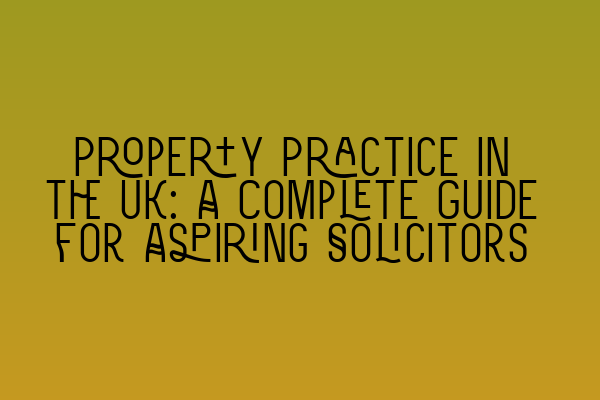Property Practice in the UK: A Complete Guide for Aspiring Solicitors
Are you interested in becoming a solicitor specializing in property law in the UK? This comprehensive guide aims to provide you with all the information you need to embark on a successful career in property law. From understanding the basics to navigating complex legal processes, we have you covered.
1. Introduction to Property Law
Property law encompasses a range of legal issues related to land, buildings, and other assets. As a property lawyer, you will be involved in various transactions, such as buying and selling properties, negotiating leases, and resolving disputes.
To excel in this field, you will need to have a solid understanding of real estate law, contract law, and land registration. Additionally, knowledge of planning law and environmental regulations can be advantageous. It’s also important to stay up-to-date with any changes in legislation and case law that may impact property practice.
2. Education and Qualifications
To become a solicitor in the UK, you will need to complete a law degree, followed by the Legal Practice Course (LPC). However, starting from 2021, the Solicitors Regulation Authority (SRA) is introducing a new way to qualify as a solicitor through the Solicitors Qualifying Examination (SQE). The SQE consists of two stages: SQE1, which tests the candidate’s knowledge and understanding, and SQE2, which assesses practical legal skills.
Preparing for the SQE can be challenging, but there are resources available to help you succeed. Consider enrolling in SQE preparation courses offered by reputable providers like FQPS. These courses are designed to support aspiring solicitors and provide them with the necessary knowledge and skills to pass the SQE exams. You can also take advantage of practice exams and mocks to assess your progress and improve your performance.
Related Articles:
– SQE 1 Practice Exam Questions
– SQE 1 Practice Mocks FLK1 FLK2
– SQE 2 Preparation Courses
– SQE 1 Preparation Courses
– SRA SQE Exam Dates
3. Types of Property Transactions
In property law, there are several types of transactions you may encounter as a solicitor. These include:
– Residential Conveyancing: This involves the purchase and sale of residential properties. As a solicitor, you will be responsible for conducting searches, reviewing contracts, and ensuring a smooth transfer of ownership.
– Commercial Property: If you specialize in commercial property law, you will handle transactions involving office spaces, retail properties, and industrial units. This area often involves complex lease negotiations and compliance with planning regulations.
– Landlord and Tenant Matters: As a property lawyer, you may also deal with landlord and tenant issues, such as lease agreements, rent disputes, and evictions. Understanding both residential and commercial tenancy laws is essential.
– Property Development: Property developers often require legal guidance throughout the development process. This can include securing planning permissions, negotiating agreements with contractors, and assisting with financing arrangements.
4. Legal Process and Documentation
Property transactions involve a range of legal processes and documentation. Some of the key steps include the following:
– Property Searches: Before completing a purchase, it is crucial to conduct searches to ensure there are no hidden issues or restrictions on the property. These searches may include local authority searches, environmental searches, and drainage and water searches.
– Drafting Contracts: As a solicitor, you will be responsible for drafting contracts that clearly outline the terms of the transaction. Accuracy and attention to detail are essential to avoid potential disputes.
– Land Registry: Registering property ownership with the Land Registry is crucial to establish legal title and protect your client’s interests. You will need to facilitate the transfer of ownership and ensure all necessary paperwork is submitted correctly.
– Exchange and Completion: The exchange of contracts marks the point at which both parties are legally bound to the transaction. Completion involves the final transfer of funds and official transfer of ownership.
5. Dispute Resolution
Disputes can arise in property transactions, and as a solicitor, you may need to help your clients resolve these issues effectively. Disputes can range from boundary disputes and adverse possession claims to breaches of lease agreements and disagreements over planning permissions.
When handling property disputes, you have several options, including negotiation, mediation, and litigation. Your role is to assess the situation, advise your client on the best course of action, and represent their interests in legal proceedings if necessary.
6. Professional Development
As a solicitor practicing property law, it’s important to continue learning and developing your skills throughout your career. This can involve attending seminars, webinars, and conferences focused on property law updates and emerging trends. Joining professional organizations, such as the Law Society’s Property Section, can also provide networking opportunities and access to valuable resources.
Closing Thoughts
Becoming a property solicitor in the UK is a rewarding and challenging career path. From mastering the intricacies of property law to navigating complex transactions, there is always something new to learn. By staying updated with legislation changes, honing your legal skills, and using resources like SQE preparation courses and practice exams, you can position yourself as a knowledgeable and successful property lawyer.
Remember, the key to success is building a strong foundation of knowledge and continuously developing your expertise. Stay committed, embrace new challenges, and make a positive impact in the world of property law.
Related Articles:
– SQE 1 Practice Exam Questions
– SQE 1 Practice Mocks FLK1 FLK2
– SQE 2 Preparation Courses
– SQE 1 Preparation Courses
– SRA SQE Exam Dates
